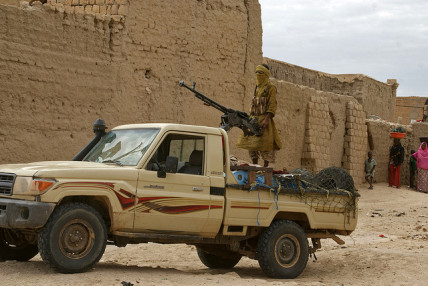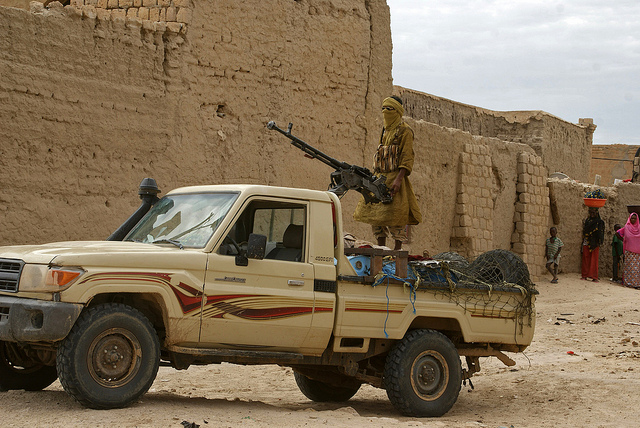
Islamist fighters near Timbuktu. Photograph courtesy of Magharebia
Since the bloody conflict in Mali began one year ago, the crisis has evolved in fits and starts, all the while immersed in a historical framework that the mainstream media too often oversimplifies. Here we will try to unpack the complexities of the conflict by putting into context the violent fighting currently engulfing the northern African country.
The conflict in the north of Mali pits the Malian army and its allies against many rebels groups fighting for greater autonomy or independence in the region. These groups include Islamist groups such as Al-Qaeda in the Islamic Mahgreb, the Movement for Oneness and Jihad in Western Africa, and Ansar Dine, and Tuareg nomads who belong to the political and military Azawad National Liberation Movement.
Let’s try to look at what the real causes of the war in Mali are [fr]:
Everything was ripe for Mali to collapse and for Sahel to explode. Weakened by austerity policies that had been imposed by the IMF [fr], paralyzed for so long by the policies ofFrançafrique, and a victim of global warming [fr]and multiple droughts [fr], Mali became one of the key players in the great new Sahelian game. The Tuareg demands; the Jihadis who had become powerful from drug trafficking; the destabilization of Libya and the uncertainty in Algeria; hidden investments from Saudi Arabia; short-sighted strategies of the United States and Europe… These are all the reasons for the war.
How did modern Mali come to be? Mouhamadou el Hady Ba and Pierre Amath Mbaye in their work “The Malian crisis and lessons for Senegal” [fr]explain how Mali emerged from the post-colonial failure of a federation in the region [fr]:
Keenly aware of the risks tied to a fragmented region, and following their Pan-African ideals,Léopold Sédar Senghor, Mamadou Dia, Modibo Keïta and other leaders still had the idea to carry on with the group that had made up the colonial administration known as l’Afrique Occidentale Française, by pushing for independence as a federation. …However, there was strong opposition from the French authorities, which at the time were linked to Félix Houphouët Boigny — an eventual Head of State of Côte d’Ivoire. This gave rise to a power struggle between French Sudan (today Mali) and Senegal, within the Mali Federation. This attempt at federation would eventually fail based on various political options and power struggles, while the Malian engagement in support of Algerian independence played out in the background. August 20, 1960, ends with the dissolution of the Federation of Mali…
Eros Sana on bastamag.net continues in his article, Mali : les véritables causes de la guerre (Mali: the Real Causes of the War [fr]) describing how Mali then experienced a brief window of socialism before a military coup brought a dictator to power:
We are in 1960, Mali is gaining independence. The first president of Mali, Modibo Keïta, teacher and Pan-Africanist, democratically elected, barely has time to begin sweeping agricultural reforms before being overthrown in 1968 during a France-backed coup d’état orchestrated by Moussa Traoré. (The 23 years of rule that followed would be bloody). Moussa Traoré was not happy with simply impoverishing and starving his people, he also carried out powerful repressive measures against the Tuareg minority group in Mali. The Tuaregs represented about 2 percent of the Malian population. They are also present in Niger, Burkina-Faso, Mauritania, Libya and in Algeria.
Mouhamadou el Hady Ba and Pierre Amath Mbaye add another important factor to the equation: the rise of drug trafficking [fr]:
And so, West Africa became a strategic point for the drug trade, following heightened efforts to snuff it out in the US and Canada. This situation would eventually cause drug traffickers to focus their efforts more on Europe by finding new routes, and to exploit the state administrations of the region that were susceptible to corruption, in exchange for guaranteeing peace. In 2009, drugs were exported from Colombia, Venezuela, and Brasil, and arrived at ports in Guinea-Bissau and Cape-Verde in the north, and at those of Ghana in the south. The cargo was then split up between Nigeria, Guinea, Senegal, Mauritania, and reassembled once again near Morocco and Algeria. In November of the same year, the entire world would come to know of the clandestine landing of a three-engine Boeing 727 loaded with cocaine. The event gave rise to a scandal popularly known as Air Cocaine, which had repercussions in South America and Europe. A confounding symbol of Africa’s insertion in the world economy, one may say mischievously, if the situation had not been so perplexing.
With respect to Saudi influence, Sahel expert Maurice Freund explained in an interview on website Afrik.com that Islamic extremism began to take root more than two decades ago when Saudi-financed organizations helped Malian people where their government failed them. “It’s too late for Mali, we should have acted 20 years ago!” he said:
More than 20 years ago now, I met Pakistanis and Sudanese people financed by Saudis. They preached [ultra-conservative branch of Sunni Islam] Wahhabism through humanitarian organizations by building wells and mosques. They made up for the shortcomings of the authorities on the social level. Hence the proliferation of the Jihadist movement. Wahabbism in the north of Mali began 25 years ago.
While trying to trace the genesis of the Djihadi movement in Sahel, Abou Djaffar explains on his blog that:
In 1996, however, it wasn’t even a question of a being secondary front in the Algerian civil war, but it was in fact the Algerian civil war that just extended in the backyard.
Repercussions [fr]of the overthrow of Muammar Kadhafi, who supplied Mali with large amounts of funding, during the Libyan Civil War in 2011 added to the volatile situation brewing in Mali, Eros Sana writes:
Aside from large investments, Kadhafi increased financing on the smaller scale: schools, health centers, roads throughout all of Mali. When Kadhafi and his regime disappeared, there was, on one side a large number of weapons, and hundreds of hardened men who were exiled in the Sahel region; and on the other side the evaporation of several hundred thousands of euros that had once flowed in. For a country where half of the population lives on less than one dollar a day, it is an important source of bread and butter that disappears. After having lent military support to the overthrow of the Libyan regime the NATO forces should have foreseen this vacuum that was was caused by the fall of the Colonel and worked to address it. That was not done.
Twitter user @Abdou_diarra foresaw on his blog the creation of new regions [fr]in northern Mali prior to the military coup that would overthrow President Amadou Toumani Touré in March 2012:
Blogger ASKIAMOHAMED writes about the Tuareg [fr]and their demands::
It begins on the January 17, 2012, about two months before the showing of force at Bamako, the rebels attack Menaka, Tessalit, and Aguel’hoc before being driven out by the Malian Army.
A bonafide game of musical chairs takes place for almost one month in the towns on the Algerian border between the army, the National Azawad Liberation Movement (MNLA) as well as the group Ansar Dine and their Al-Qaeda allies from the Islamic Maghreb.
The massacre at knifepoint of Malian soldiers by Malian rebels and their allies at Aguel’hoc, severely shocks the Malian people and bring to light the failings of the army and the bitterness of this rebellion.
At the start of April, the coup [against President Amandou Toumani Touré]already executed, the MNLA and their Islamic allies control two-thirds of Mali. The Malian army, having been taken by the surprise by the coup, have deserted.
In fact, the coup ambushed the chain of command within the army and highlighted its vulnerability thereby driving this disbanding or “strategic withdrawal”.
The MNLA proclaims the independence of this zone on the April 6, 2012 because it believes that the region is the cradle of the Tuareg civilization, an unprecedented act because no nomadic people have ever claimed a territory with precisely defined borders.
Moreover, historically in this region there was the Songhai empire founded at Koukia in the 7th century by the Songhai and Berbers and led by chief Za el-Ayamen. They fled before the Arab invasion.
The mixing of Songhai and Berber people would eventually give rise to the Dia dynasty. After this came the Sonni Ali Ber dynasty and the Askia with Gao being the capital, before succumbing, in the 16th century to the Moroccan invasion. There was also the Massina Empire and the Toucouleur Empire of the 19th century. Not to mention various tribes, Bozos (a tribe of fishermen) and Dogons inhabited this zone. Therefore, there is no historical legitimacy to this demand.
It is in this context that France is intervening [fr] in its former colony to oust the Islamists, a move known as Operation Serval.
Though some think that France’s intervention in Mali is driven purely by self interest, such as the author of this article entitled Nouvelles de la turbulence (News of the Unrest) [fr], such speculation [fr]should be treated with caution:
Supposedly, there could be be more uranium in Mali than in Niger, and after having secured the Libyan resources (not counting those currently being currently explored), the French would be seeking to do the same thing in the Sahel region. …We wouldn’t go to war for“potential” resources unless we knew the real quantity and quality of these resources. The resource-speculating arguments might be naive at first but perhaps not entirely off-base in this case.
Wirriyamu responds in this article Ne pas laisser dire (3) [fr](Do not let it be said):
I am now convinced that some find the support of the Malian public, not to mention African support for this intervention, to be completely abnormal. They usually place the blame for this support squarely on the back of naivete or ignorance, as the case may be. This shows that many — too many for my taste — still think that Africans have had no active role in the course of history [fr]. It happens without them. In sum, they are victims.
Written by Anna Gueye and translated by Danielle Martineau




